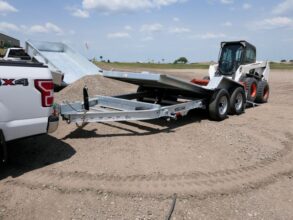Case Study: Compact Horizontal Grinder Helps Construction Company Reduce Waste
Telluride, Colo. has a long and storied history. During the late 1800s, this mining town attracted people from throughout the country looking for the gold, silver, iron, lead and copper ores that were prominent in this area. Once the mining industry left, Telluride became a ghost town. In 1970, Telluride discovered another type of gold – it was called snow, and this small community has now become a world-renowned resort area. Telluride is known for its skiing, breathtaking scenery and high-end homes. But it’s also becoming known for its efforts to protect and preserve the environment. Finbro Construction understands this well.
Finbro was established in 2006 by Werner Catsman and Steve Finger based on their belief that they could create a new kind of construction company – one that maintains a high degree of accountability to all stakeholders and delivers what they set out to perform.
The company is currently managing the construction of a condominium project that will include 30 to 40 units. The condos range in size from 3,000 to 4,000 square feet, and will sell for an average price of $4 million each. The vast majority will serve as secondary homes for the owners.
“What sets our company apart from others is accountability,” said Catsman. “We hold ourselves accountable to the customer, their budget and the environment.”
This environmental consciousness is what led the company to explore ways to reduce the wood waste being sent off the jobsite.
“We were filling four to six 22-cubic-yard dumpsters every month with construction waste,” said Catsman. “One of our superintendents began exploring ways to reduce the amount of construction waste sent offsite and discovered the Vermeer HG200 horizontal grinder.”
The HG200 is a compact horizontal grinder that turns wood chips, organic construction debris and green waste into a range of usable end products that include ground cover, landscape mulch, animal bedding and compost. The unit features a hammermill drum and replaceable screens that create a uniform end product.
According to Catsman, they use the unit to process scrap lumber. So far it has reduced construction waste haul off by 75 percent. The company only fills one to two dumpsters per month and has reduced its monthly dumpster expense from $3,500 to $1,500 per month.
The HG200 produces more than a cost savings to Finbro; it also produces a valuable by-product – landscape mulch.
Scrap lumber is processed and piled on the ground for use as landscape mulch once the construction process is complete. Construction waste not suitable to become landscape mulch is processed and placed into a dumpster.
Finbro also uses the grinder to process green waste on new construction sites. From time to time the company will clear trees for a new development. These trees usually have higher sap content, making the resulting mulch ideal for dust control on the jobsite.
The HG200 has helped this fledging company reduce costs in an industry with tight margins, but also stay true to their philosophy of accountability.


